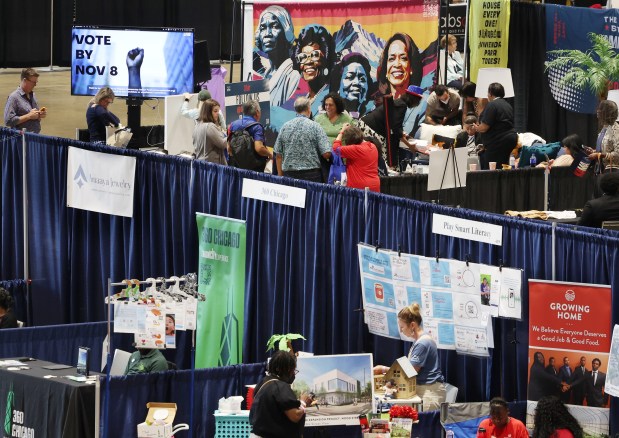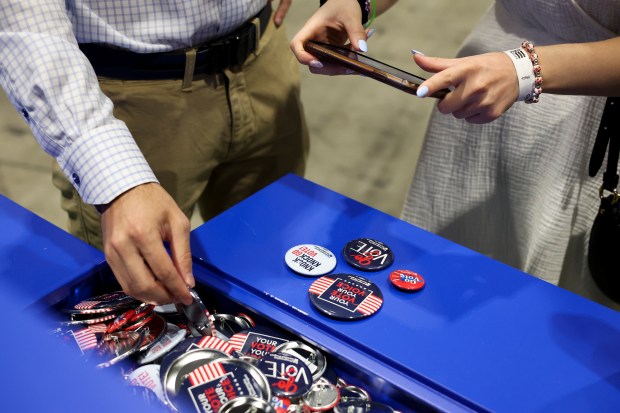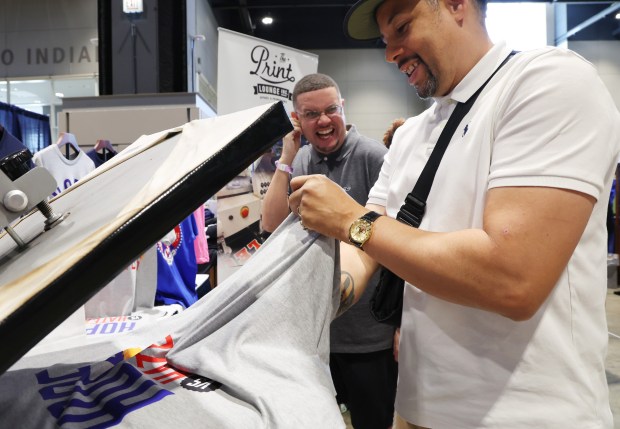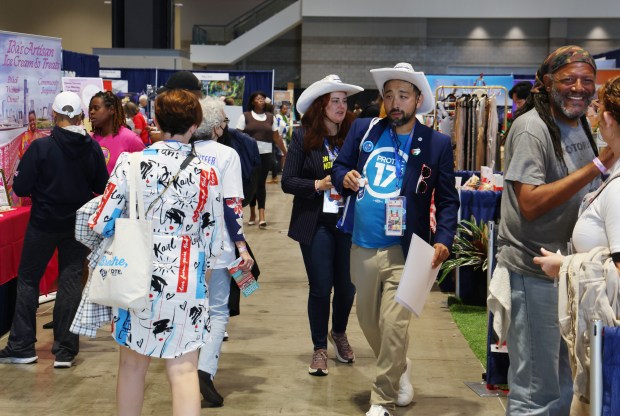About midway through the first day of the Democratic National Convention, a delegate from California stopped on the second floor of the Hyatt Regency and locked eyes with a member of the media and held herself very still, like a tree in a violent storm. Around both of them speed-walked delegates from other states and politicians from small towns and politicians from large towns and staffs of politicians and campaign workers and camera crews pushing carts loaded with canvas luggage. The woman looked alarmed. The member of the media stopped and tilted his head as if to ask, do you need help?
After a second, the delegate from California finally spoke and pointed west:
“Is the United Center that way?”
She seemed to mean, at the end of that long hotel hallway? The United Center, she was informed, was about three and a half miles that way. She was standing in the Hyatt attached to McCormick Place. She looked profoundly confused by McCormick, which, to be fair to her, is the only acceptable reaction to McCormick Place. No, no, she said, slowly, pained, with an exasperated sigh, having obviously stopped the most clueless man in Chicago. If the United Center is so far in that direction, then what happens here?
Good question.
The answer is, a whole lot of everything associated with the DNC, just as long as you’re not thinking the big speeches on TV or the big protests on TV, or really any of the excitement. None of the sexy stuff. Here are meetings, speeches, caucuses. The United Center is where the world turns it eyes. McCormick Place, the other, less glitzy official DNC center of gravity, is where delegates pass the day; where a woman waits in line for breakfast wearing a T-shirt asking voters to consider someone named Bailey for Municipal Water District Division 1; a booth promoting Democrats for atheism sits across from a young woman pleading student-loan forgiveness; a delegation from the Service Employees International Union holds a luncheon; and Joel Carter creates political pins.
Carter, of Chicago’s Busy Beaver Button Co., received personalized requests for a Harris/Walz button. He placed the request on an oval sticker, placed the sticker inside a metal whatzit, watched a blunt lever slam down, then stamped out a new DNC pin: “Very Demure for Harris” and “Crazy Cat Lady for Harris” and “People Who Believe in Science for Harris” and “Keeping My Black Job — Harris 2024.”
In the first hours of the convention, he’d already made a few hundred.
“Beep! Beep!” shouted an older woman in a red, white and blue cowboy hat, steering her electric wheelchair through the crush of people waiting for their own political pins. She was headed to a DNC merch area, toward $30 mugs decorated with presidential heads, hats with donkeys in sunglasses and shirts reading “Trust Democratic Women.”
Just beyond the merch, signs for something called “DemPalooza.”
Meet the DNC delegates: An Alabama leader who was here in 1968, Patrick Kane’s aunt and more
Think a fan convention within a convention, tucked away, for politics, and at least early in the week, sparsely attended, and representing many, many disparate interests. Booths for the Westside Justice Center and the League of Chicago Theatres. Booths selling candles and painting DNC-inspired nails. The Democratic Lieutenant Governors Association beside Alliance for Retired Americans, not far from Planned Parenthood, itself alongside YWCA of Metropolitan Chicago. Here you could find Vice President Kamala Harris as cultural icon — painted into a mural with Harriet Tubman on Mount Rushmore, Harris in Superman tights — though not nearly as much iconography as a Trump rally.
The line to escape DemPalooza was about 45 minutes long.
The line to get into DemPalooza was nonexistent.

An older man walked by dressed in a green leaf-themed sports coat, wearing a green leaf-covered bucket hat that was topped with a working replica of a wind turbine.
He angled past men in navy blue suits who huddled as if discussing their auditions for a “Succession” reboot. In fact, swaths of McCormick, where many delegates and aides were staying, resembled a “Succession” cosplay con. Talking heads, in plain view, forgoing privacy, turned laptops away from the sunlight streaming into the hall and did their 10 minutes on cable TV news shows, right there. If you were not a delegate, you worked for a campaign worker or, oh, served on city council of someplace somewhere. Walking through McCormick was like vaguely being recognized by thousands of strangers: Each passing conventioneer would glance down at the lanyard around your neck, to get a quick read of who you might be, then raise their eyes and turn away since you were no one.
Adrita Rahman of Minneapolis stood in a large wide McCormick foyer with a pair of fellow Minnesota delegates. Even in a convention where thousands of the 50,000 visitors to the DNC wore lanyards reading “delegate,” Rahman and friends were different. They were officially of the Uncommitted contingent, not pledged for Harris until they saw some movement with United States support for Israel in Gaza. They wore matching white T-shirts revealing their cause and Palestinian keffiyehs at their necks. Rahman pointed out that there were also “the Ceasefire delegates,” who were not to be confused with the Uncommitted delegates, though, naturally, they share common aims.
“I haven’t been here long yet,” Rahman said, meaning the DNC, “but so far, the reception from committed delegates — surprisingly open! And really, I didn’t know what to expect. I had some feelings about coming here, of course, and truthfully, again so far, I’ve had so many (delegates) kind of quietly say to me, ‘I stand with you,’ then: ‘And, uh, could I get one of your buttons?’”
They were hosting a get-together and panel later that day.
But then — who wasn’t?
Get in line.

No really: Get in line. Also that line. And that next line. Outside of McCormick was eerie for a weekday morning, the surrounding streets quiet and still, so deeply barricaded behind layers of barriers, manned by layers of police and U.S. Capitol police and more police, a woman wearing a T-shirt reading “My Black Job is Voting” stood outside, along Martin Luther King Drive for a long while, pacing a usually busy stretch, talking on AirPods and chain smoking. But inside, lines. Police dogs smelling you in line. Snippets of line conversation you never hear anywhere. Like, “You have a real chance at mayor!” And, “Have you ever heard of Horseshoe Theory?” And, “What I remember from 2016 was thinking never had I ever thought my father could be so dumb.” And, from a security guard: “I tell politicians where to go, they get lost, they return and we go through this (expletive) all over again. I mean, get out of Appalachia once in a while.” A man walked by in green T-shirt so loaded down with political buttons, his crewneck sagged into a V-neck.
There were meetings in corners, meetings on patio furniture, meetings behind doors.
A speaker in the Hispanic Caucus reminded members that they have to show the TV cameras they are ride-or-die with Biden even if they are voting for Harris now. A smatter of claps. A moment later, as the energy began to lag, the other half of the Harris ticket, Gov. Tim Walz waltzed in. The members, spread across the ballroom, surged forward, cellphones out. Walz gave a pep talk, the greatest hits, referring to “the coach in me.” Then after a lot of applause he left, and a number of members began to follow behind.
“Wait, could we sit?” an organizer asked. “We still have the room for an hour.”

Over at the Black Caucus, Texas Rep. Jasmine Crockett was giving a rousing talk, rollicking, blunt, noting some polls have said Vice President Harris doesn’t have the popularity with Black voters that former President Barack Obama had, but she thinks that’s because Harris was a prosecutor. And yet, she added, saying something she would not say later that night on the convention floor: “Some people need to go to jail!”
At the DNC Council on the Environment & Climate Crisis, they talked climate justice, and the climate accomplishments of the Biden/Harris White House, and the way to win office on a climate platform. Randi Weingarten, president of the American Federation of Teachers, got up and said they were preparing to never go back, to always move ahead. It was rhetoric, it’s a political convention. They talk. In fact, Weingarten added:
“I’ve done two screaming speakers in here in the last hour and so you’re not getting a screaming speech. … But oh, who knows if you’re not getting a screaming speech?”
For the record, a moment later, at McCormick, she started screaming again.
cborrelli@chicagotribune.com



